| Of Castles and Kings |
| |
|
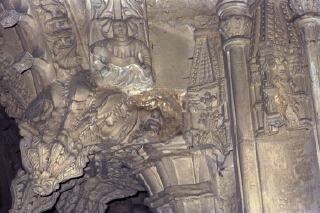 |
 |
| Roslyn Chapel, in the village of Rosslyn
(yes, different spellings again), was built by the Sinclair family.
One early member of the family was a member of the group that took King
Robert the Bruce's heart on Crusade after his death. When the Chapel
was built, the Bruce's deathmask was carved into the ceiling of the
chapel; unfortunately, this means that when standing below it, all you can
really make out are his nostrils! |
A much prettier picture from Roslyn Chapel. |
| |
|
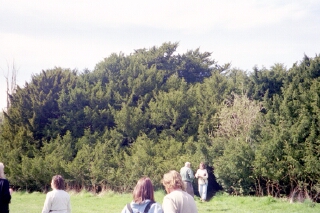 |
 |
| From the outside, this looks like a thicket
of many trees. But it is all the growth of a single yew tree; notice
the small opening by which the group entered under the canopy. |
This tremendous old yew tree (at least 800
years old, and very possibly more than 1,000!) has seen the history of
Scotland pass beside it and underneath its branches. We are standing
beneath a canopy that is easily 30 or 40 yards across, all from the
branches of this one tree! |
| |
|
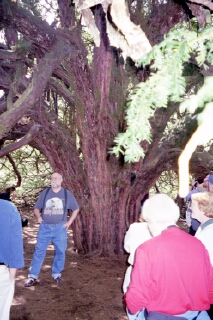 |
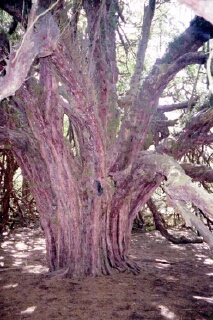 |
| Brian McNeill, one of the best-known
songwriters and musicians in Scotland today, wrote a song called "The
Yew Tree" about this very tree. Here, Brian tells the group
about how he found the tree (the locals don't encourage it, as it means
more to them than just a tourist stop) and was inspired to write the song. |
A better look at the main trunk of Knox's
Yew, so-called because early Presbyterian minister John Knox preached his
sermons under its branches while he was still on the run as a heretic (at
the start of the Reformation in Scotland). Yews, like banyans and
some other trees, put down trailers from their branches which re-root,
which is why this is the "main", not the only, trunk of this one
tree. |
| |
|
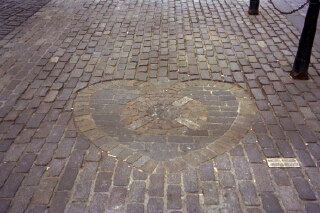 |
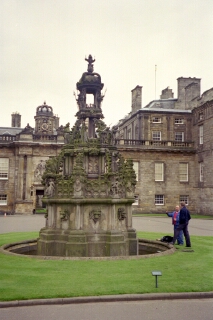 |
| Edinburgh is in the region called Midlothian,
which separates the two regions of East and West Lothian (go
figure!). The phrase "Heart of Midlothian" has long been
used to describe it, as indicated by this brickwork on a pedestrian mall
in the city. One of the local football (soccer) teams is also called
"Hearts of Midlothian". |
Holyroodhouse ("house of the Holy
Rood", or True Cross; supposedly a fragment of the True Cross was
brought back from the Crusades and kept here) is a royal palace in
Edinburgh. While still used by members of the Royal Family when they
visit Scotland, its most famous inhabitant was Mary Stuart, Queen of
Scots. This fountain is in the courtyard; unfortunately, photography
is not allowed inside so I cannot show the many beautiful paintings and
rooms therein. |
|
|
 |
 |